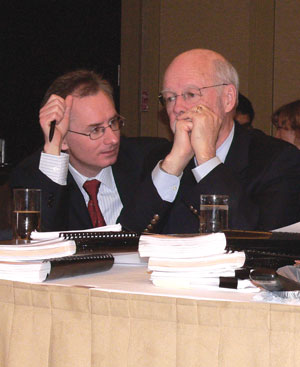Embattled Superior Court Justice Paul Cosgrove is clinging to the hope that the Canadian Judicial Council will let him play out the final months of his judicial career rather than oust him based on an attorney general’s 2004 complaint.

The CJC recently held a special meeting in the ballroom of a downtown Toronto hotel in which Cosgrove made a final plea, explaining why judicial misconduct he committed during the 1998 murder trial of Julia Elliott should not lead to what his lawyer called “capital punishment for a judge.”
It was only the third time the CJC has held such a meeting through its inquiry process. Should the council rule against Cosgrove, he would become just the second judge to face a recommendation to the federal minister of justice for removal.
Cosgrove, 74, responded to the findings released in December by a CJC inquiry committee, which ruled 4-1 there are grounds for his dismissal.
The Brockville judge told the council, which is made up of chief justices, associate chief justices, and senior judges of Canada’s superior courts, that he failed at his task of handling the Elliott trial.
But he said his mistakes were “made in good faith at all times,” and he regrets that those errors hurt some people involved in the trial. He characterized his errors as “misguided attempts to achieve justice.”
Cosgrove, who was appointed to the bench in 1984, also explained his confusion as to why then-attorney general Michael Bryant waited until April 2004 to issue a complaint over his handling of the trial, which he stayed in September 1999. Cosgrove said he had become desensitized to criticism of his handling of the trial by the time the complaint was made.
He said it was based on “an important issue of principle” that he opted to pursue a constitutional challenge of the CJC proceedings at the Federal Court in 2005. He won that decision, but the Federal Court of Appeal later overturned it. The Supreme Court of Canada rejected Cosgrove’s leave to appeal application in November 2007.
The judge told the council that a statement made to the inquiry committee was meant to fully recognize the mistakes he made during Elliott and apologize to those who suffered because of them. He reaffirmed his apology to the attorney general, police officers, civilian witnesses, the public, and the family of the victim, who he acknowledged were forced to wait too long for justice.
Cosgrove also said he regrets any damage he may have done to the judicial office he holds.
The former Scarborough mayor and federal Liberal cabinet minister said he can best serve his community by returning to the bench until he reaches mandatory retirement this December. He added that he stands by his performance as a judge both before and after Elliott.
Chris Paliare of Paliare Roland Rosenberg Rothstein LLP, Cosgrove’s lawyer, told the council that based on its previous analysis of an inquiry into the conduct of Superior Court Justice Ted Matlow, the CJC must apply a two-step test when deciding if a recommendation should be made to remove a judge.
He said the first stage - whether the judge has committed judicial misconduct as defined by the Judges Act - has been met. But he said it has not been established that the finding of misconduct merits removal based on all other relevant circumstances.
Paliare argued that Cosgrove’s apology, independent counsel Earl Cherniak’s position that removal is not merited, glowing character letters, and the fact that he sat as a judge for over four years following Elliott without facing a complaint means a “strong admonition” is punishment enough.
The complaint against Cosgrove followed the Ontario Court of Appeal’s 2003 decision to overturn the judge’s decision to stay proceedings against Elliott and order costs against the Crown. Cosgrove cited 150 alleged Charter violations by Crown counsel and senior members of the Ontario Ministry of the Attorney General in his ruling.
The appeal court said the evidence did not support “most of the findings of Charter breaches by the trial judge.”
The inquiry committee’s December ruling stated, among other things, that Cosgrove allowed defence counsel at Elliott to “take control of the trial”; failed to curtail inappropriate cross-examination by defence counsel; demonstrated an “appearance of anti-Crown bias”; and abused his contempt powers, noted Cherniak in his submission to the council.
The inquiry committee also reported that, “an observer of the trial could only have concluded that Justice Cosgrove continually exhibited a bias against the Crown’s position.”
It also took the position that his conduct “includes everything from rude, abusive, or intemperate language up to the misuse of contempt power, or threats to do so, and beyond that to defamatory statements of persons who had done no wrong who, in some cases, had no opportunity to answer the judge’s damning allegations.”
Elliott pleaded guilty to manslaughter and received a seven-year sentence after the appeal court ordered a retrial.
The council, which is not beholden to the inquiry committee’s finding, reserved its decision.

 The CJC recently held a special meeting in the ballroom of a downtown Toronto hotel in which Cosgrove made a final plea, explaining why judicial misconduct he committed during the 1998 murder trial of Julia Elliott should not lead to what his lawyer called “capital punishment for a judge.”
The CJC recently held a special meeting in the ballroom of a downtown Toronto hotel in which Cosgrove made a final plea, explaining why judicial misconduct he committed during the 1998 murder trial of Julia Elliott should not lead to what his lawyer called “capital punishment for a judge.”